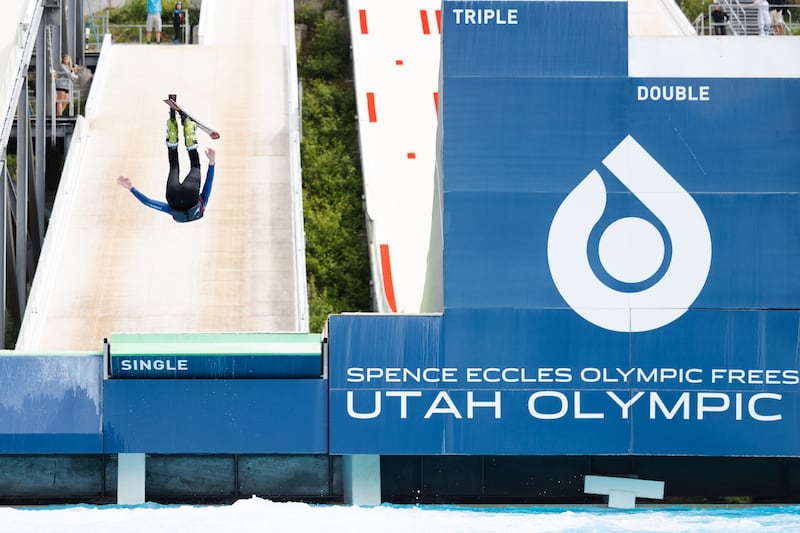Salt Lake City could be on its way to hosting another Winter Games as soon as October, a top U.S. Olympic & Paralympic Committee official said Monday. But whether that is for 2030 or 2034 remains to be seen.
“The direction we’re getting from the (International Olympic Committee) and the (IOC) Future Host Commission are very encouraging,” Gene Sykes, chair of the USOPC board of directors, told reporters during a media call.
That’s because the Future Host Commission, charged with recommending to the IOC Executive Board which cities advance to the final stage of the new, less formal Olympic bid process known as targeted dialogue, “is making progress,” Sykes said.
The USOPC is “in constant touch with the IOC to try to gauge how they’re bringing their members along and how the executive board is being briefed by the Future Host Commission, which is where this really sits,” he said.
“What we’re trying to make sure we share with you is our sense of enthusiasm and confidence that Salt Lake City is on the right track,” Sykes said, acknowledging that the decision could still wait until December as expected.
Once a bid city is moved to targeted dialogue by the IOC leaders who make up the executive board, that city is considered the “preferred” pick to host and contract negotiations get underway.
Last week, the IOC’s director of communications, Mark Adams, told reporters “all things are entirely possible” under the new bid process when asked about the targeted dialogue picks being made at the executive board’s October meeting.
“And obviously, that could happen if they were to decide that it was worth advancing,” Adams said after the executive board heard a report from the Future Host Commission that wasn’t on the agenda.
But Fraser Bullock, president and CEO of the Salt Lake City-Utah Committee for the Games that’s bidding to host in 2030 or 2034, still sees the decision coming in December. A final vote by the full IOC on the Winter Games host is not expected until mid-2024.
“If it happens sooner, that would be great. But we’ve been patient and continue to be patient, recognizing that the next 12 months are going to be really critical in the entire process” Bullock said.
The bid leader said, however, he is sticking to the December timeline “with the understanding that things are always fluid. Our best strategy is just to be prepared and stay ahead of the process, which we’ve done.”
Salt Lake City is one of six cities in the race for the 2030 Winter Games, along with longtime contenders Sapporo, Japan; and Vancouver, Canada; new bids from Sweden and Switzerland; and a sixth location the IOC has declined to identify.
Unlike the other cities in the running, Salt Lake City has publicly declared a preference for waiting until 2034 to host, to avoid competing for domestic sponsorships with another Olympics in the United States, the 2028 Summer Games in Los Angeles.
Sykes said Monday it’s still not clear which Winter Games Salt Lake City is being considered for at this point.
“To be honest with you, we don’t really know, in 2030 or 2034, until we know whether there is an alternative 2030 host. And that, I think, is still something that’s being developed by the IOC,” he said.
“So I think we have a lot left to know before we can speculate. But we’ll know soon enough, Sykes said, adding the USOPC is providing “very deep, persistent, positive and really constructive engagement” as well as support.
“I think all of us in the United States, and certainly all of the people in the city of Salt Lake City and the state of Utah should feel confident and, I think, encouraged by everything that we’re learning,” he said.
The IOC made it clear last December that additional bids for 2030 would be welcomed after the executive board put off choosing Salt Lake City, Sapporo or Vancouver without setting a date for a final decision.
Sapporo and Vancouver have both struggled — Sapporo, because of an ongoing scandal involving the 2020 Summer Games held in Tokyo a year late, and Vancouver because the provincial government hasn’t pledged the needed financial backing.
The reason given for the executive board’s delay was to study the impact of climate change on the Winter Games, including potentially rotating the event among pre-selected hosts deemed to have cold enough conditions for snow sports.
A report on climate change and the feasibility of rotating future Winter Games, as well as if the hosts for 2030 and 2034 should be selected at the same time, is scheduled to be given at the IOC session in October, in Mumbai, India.
Sykes “it’s still early days” in the discussions to talk about how a potential U.S. host for a rotating Winter Games would be chosen. But he suggested Salt Lake City would be a good candidate.
“We support the idea of investing in communities that can be Olympic hosts and Salt Lake City, I think, is an excellent example,” he said, since Utah’s 2002 Winter Games venues remain in use. “That’s one of the things that makes them such a great host either for 2030 or 2034.”


